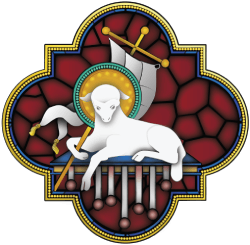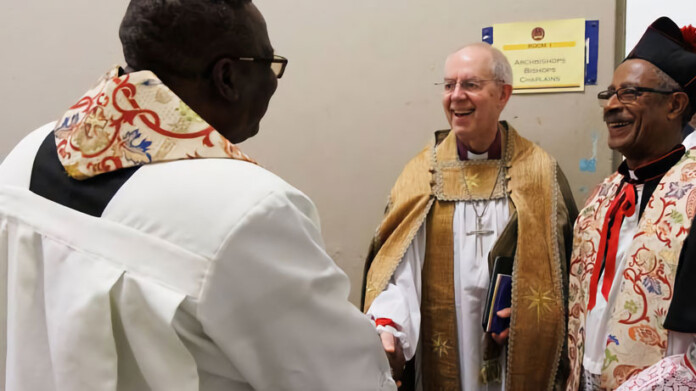The Archbishop of Canterbury preached on repentance, suffering, and the church’s acts of mercy during a bicentennial celebration of the Diocese of Jamaica and the Cayman Islands. The Eucharist at the National Arena in Kingston was part of Archbishop Justin Welby’s brief visit to Jamaica on July 18-21. As with so much of his travel, the archbishop was joined by his wife, Caroline.
Welby led with an acknowledgment of the Church of England’s complicity in the slave trade. He called the invitation by the Most Rev. Dr. Howard Gregory, Archbishop of the West Indies and Bishop of Jamaica and the Cayman Islands, “an act of grace and forgiveness on your part.”
“The votes of the bishops in Parliament were a support for slavery and their receiving of compensation for freeing the slaves was a profit from slavery,” Welby said. “Today we know that was wrong, a vile and disgusting sin. … There remains in many hearts resistance to the concept of enslavement as our sin, and to the celebration of ending the idea that a human being can ever be a possession. The church sinned and consumed the sheep.”
Speaking after Hurricane Beryl wreaked the sort of widespread damage familiar to residents of the Caribbean island, Welby drew from the example of a brother bishop, the late Désiré Mukanirwa of the Diocese of Goma, to offer encouraging words.
“You do what you can, not what you can’t,” he said. “I think the toughest part of ministry and being a church is not the things you do, but the things you don’t have the resources to do. And then we beat ourselves up and we feel guilty. A friend of mine in eastern Congo, who died during COVID, a very close friend, a bishop, one of the finest bishops in the Anglican Communion, gave his life in service during COVID and during the Ebola epidemic up with the militias in the northern part of his diocese. He said to me, when I said in a refugee camp of 25,000 people, ‘How do you deal with this?’ He said, ‘I do what God gives me the resources to do, and the rest is his problem.’”
The archbishop drew on another friendship, with liberal Christian activist Shane Claiborne of Philadelphia’s impoverished Kensington neighborhood, in speaking of how the light of God shines in often dreary conditions.
“He’s been there for 25 years. He’s watched that part of town burn in a great fire. He’s helped to build it together. He brings the churches together — Franciscan sisters, who minister to those wounded and hurt by the drugs. Protestant Mennonite communities who have a small hospital. And in his community, they have a forge where they can melt guns down or cut them up. I have an example, he gave it to me. It’s not a gun anymore. It’s a cross.”
He added: “That is conversion. That is what God does with our sin-filled, sinful, sin-darkened church. That is what God does. And that is part of the story of the diocese today. Yesterday, it was savaged by its shepherds. Today it is a diocese that suffers from the consequence of the past when it was the church of slave owners; suffers from the agonies of the present when it must minister to those touched by hurricanes, by gangs, by drugs themselves, by guns; suffers from all the terrible consequences of climate change as well as hurricanes.”
“So I say to you today on your 200th birthday, don’t be surprised by suffering. Know that God is the one who overcomes. We have hope amid the sufferings and failures of the church. Its future does not depend on our successful decisions, on our being good, but on God’s accomplished, already achieved, overcoming of evil. Let the good news of Christ grip you. For when it does, the Holy Spirit fills us with joy. We can say confidently, ‘I am loved by God.’ … God calls each person who seeks salvation into service. God brings us to love one another.”




